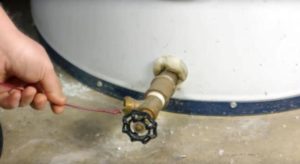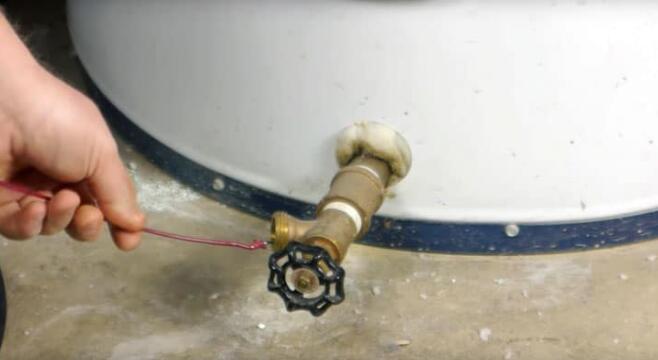Let’s face it. We all have our fears about almost everything that surrounds us. We fear things that can cause our lives to spiral out of control and makes us face problems. Just like any appliances in our house, our water heaters can malfunction. Malfunctioning maybe as a result of several issues. From technical faults, leaks, or clogging. These can be a costly affair and you should often run maintenance checks to ascertain repair needs.
It is a normal phenomenon for water heaters to get clogged. Clogging generally means dirt and sediments settle at the tank’s bottom causing a blockage. With the continued operation, there is sediment buildup in your water tank, and this leads to dirt settling in your tank. As the water heats over time, minerals in the hard water settle at the bottom. Also, if there is imbalanced pressure in the tank, corrosion is inventible. The metal structure of the tank starts rusting overtime and the rust settles causing clogging.
Why is flushing your water heater tank so important?
Flushing a water heater aims at preventing a build-up of dirt, scale, or mineral deposits in a water heater. As earlier mentioned, mineral deposits may fill your water heater tank. The continuous use of your water heater means a crustier and thicker coat of sediments piling up at the base of your tank. This can be experienced in both gas and electric water heaters. As a result, the coat hinders even heat distribution among the heating elements. In this case, there are pressure balance issues that might result in water getting in contact with the tank. As a result, corrosion takes over.

Flushing your water tank aims at reducing clogging of the release valve which can malfunction leading to leaks. By flushing your tank regularly, you reduce the risk of incurring high maintenance costs. Draining your clogged water heater tank should not be a problem. A drain valve found at the base of your water heater tank helps us drain them. By opening the valve, you will be aiming at flushing or reducing clogging of your water heater tank. This is the only time you get to use the drain valve. Please note that if the sediments contain minerals like calcium or iron, you might have problems. Flushing this type of a water tank becomes a problem.
Things You Need.
Draining your clogged tank requires you to have some equipment. It shouldn’t be a problem at all if you carefully follow steps needed. Here is a list of some of the equipment you should have.
- A strong and sturdy pipe wrench.
- A garden hose.
- A washer hose.
- Leather hand gloves.
- A screwdriver.
- Safety goggles.
Checking for clogging, Steps to follow.
Unclogging your water heater valve can be a tiresome or simple task. Remember, this is one of the routine maintenance checks that will prevent you from replacing a water heater. Unclogging helps reduce cracks in your tank that may cause leaks. Below are some steps to follow if your drain valve is clogged.
- Ensure you switch off the power supply to the tank. If using a gas water heater, turn the pilot knob to off. In case of electric supply, make sure to switch off your circuit breaker.
- With a garden hose in place, fix it to the tank’s drain valve. Ensure the hose is properly set to release the water. After checking whether it is tightly sealed off, open the drain valve.
- Be on the lookout to and try directing air to escape into the tank.
- If you carefully inspect this water and find out that it is clear then no clogging took place. The valve was free from clogging. If water is not draining, consider unclogging. The drain valve is in most cases too clogged.
As a word of caution, water in this water heater may be hot. Safety precautions must be adhered to in making sure injuries are avoided. You should not be burnt in the process of unclogging your water heater. On the brighter side, allow the water up to 24 hours cooling time before flushing or releasing the water.
Unclogging Your Drain Valve.
Determining the extent of clogging will relieve you of time and money. After carefully assessing the clogging, you can take the next step. There are various methods you can use to unclog your drain valve. It depends on the extent of the clogging problem.
Using hot water. Passing a stream of hot water through the drain valve can remove dirt and other sediments. Make sure you wear protective gear.
Back flushing. Make use of a washer fill hose to flush your drain valve. Water pressure pushes away the clogged sediments.
Forcing air through the drain valve. Create a few air bursts into the tank when your hose is intact. This is a good way to relieve your drain valve. If using a garden hose, you can easily nail this method.
Exercise some patience when draining. Allow water to drain slowly. This eventually gives way to unclogging leading to full draining.
Wire fishing. A coat hanger can be used to remove coatings in a drain valve. By wiggling this wire in the valve, you can remove debris from the valve.
Consider replacing your drain valve. Serious clogging can push you to buy a new drain valve. You should never let it get this far.
Making sure your water heater works depends on the various steps you make. Schedule a plan to run routine checks on various units of your water heater. By carefully examining the condition of your water heater, you will be doing yourself a big favor. Clogging is a possibility when using a gas tankless water heater or electric water heater. Regularly checking your drain valve for clots or debris is a sure way to preventing clogging. It sucks trying to flush your water heater for water to fail coming out. This is one disappointment you can encounter when clogging occurs. Don’t be in a hurry to unclog your drain valve. Make sure you have all the necessary tools and adhere to safety precautions. If not sure what to do, you can use the services of a qualified and skilled plumber.


